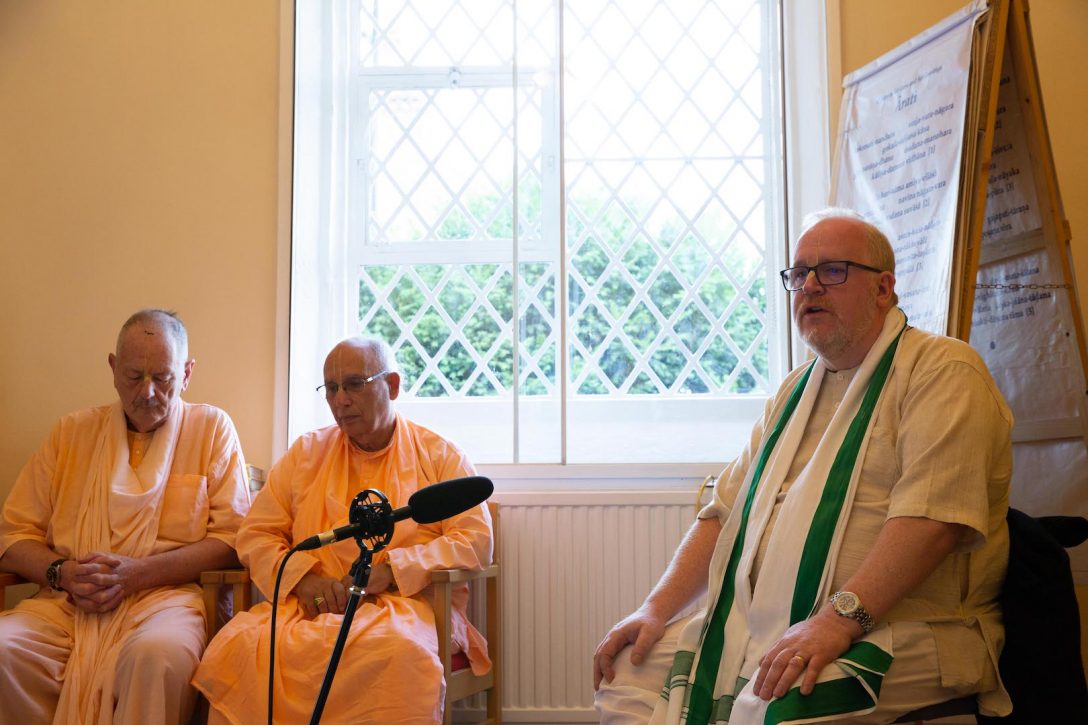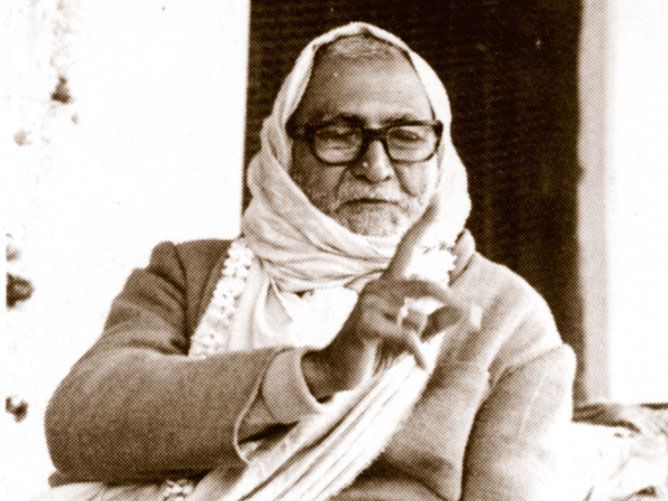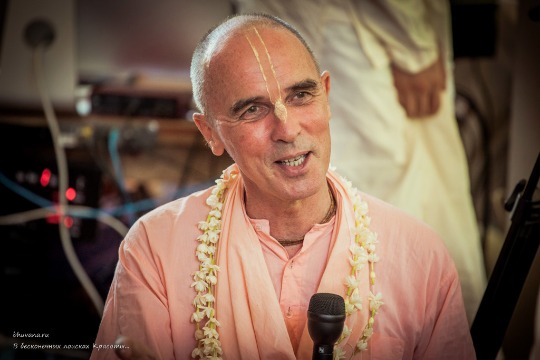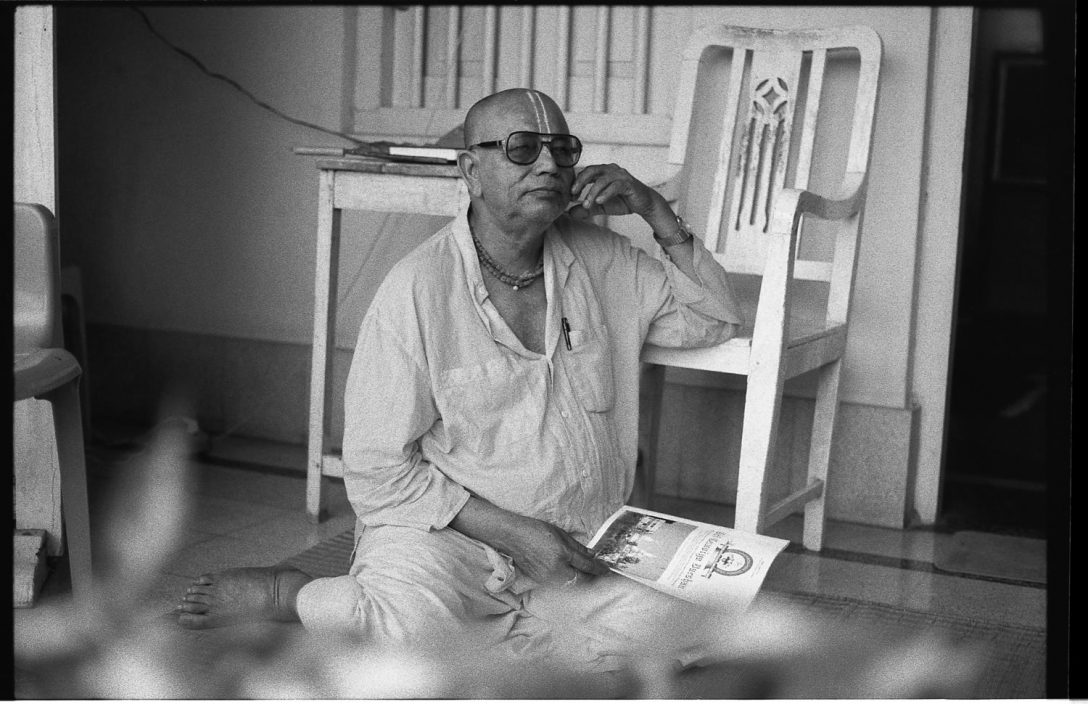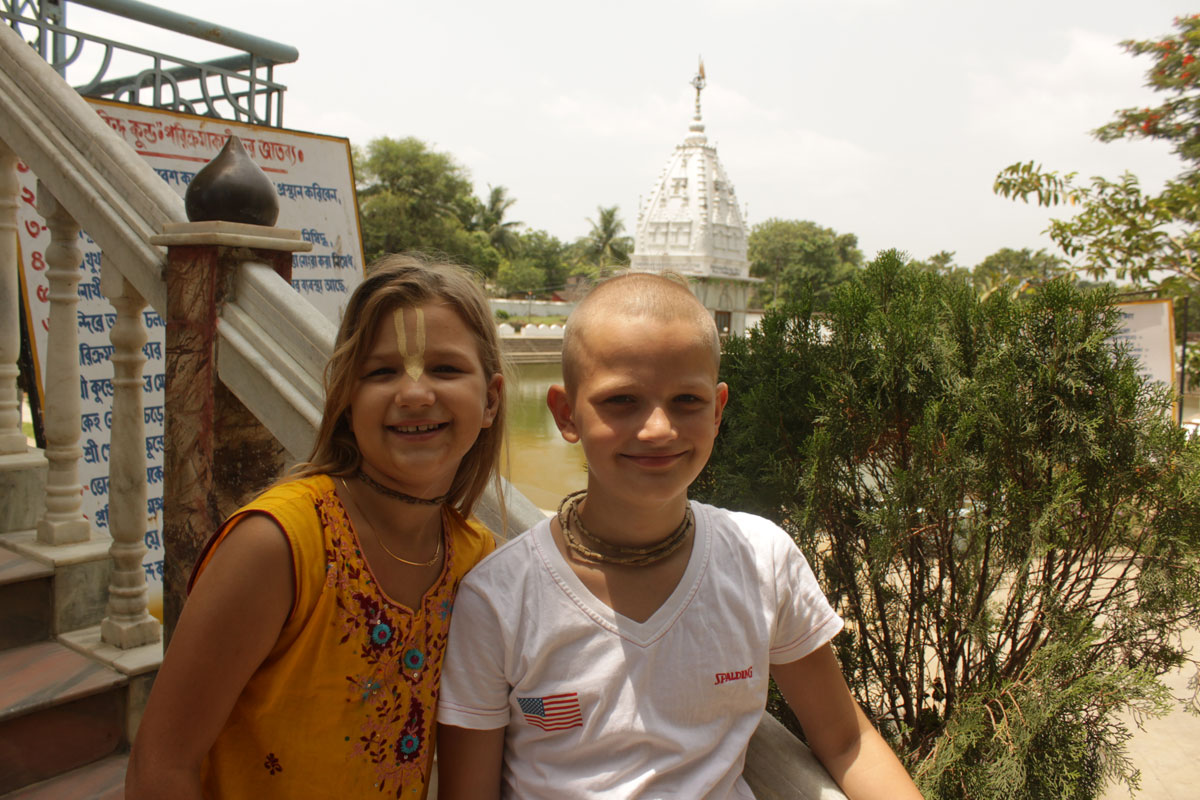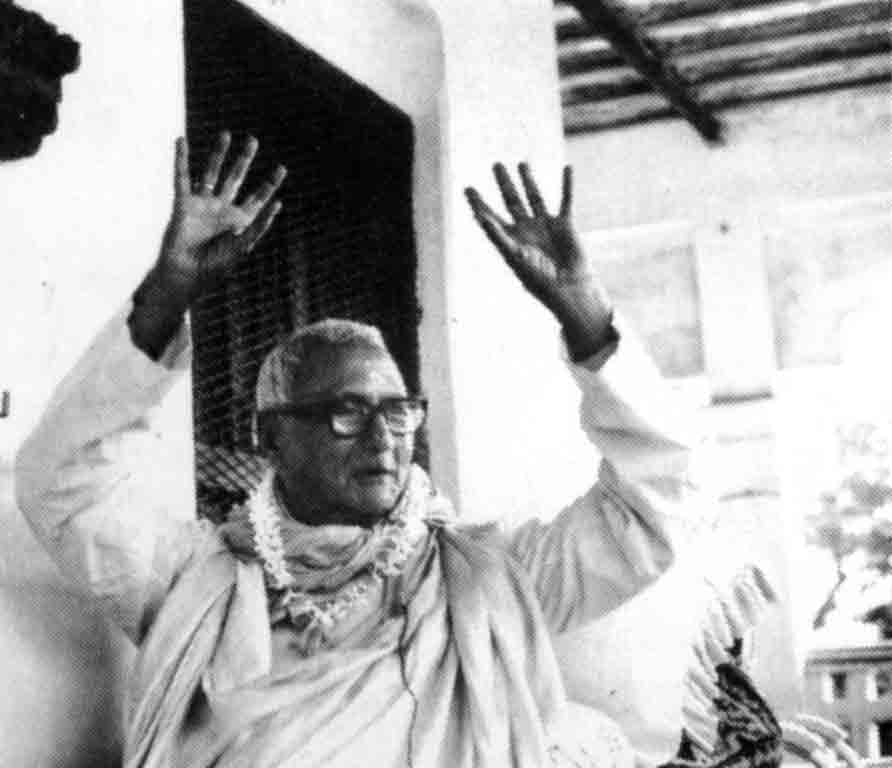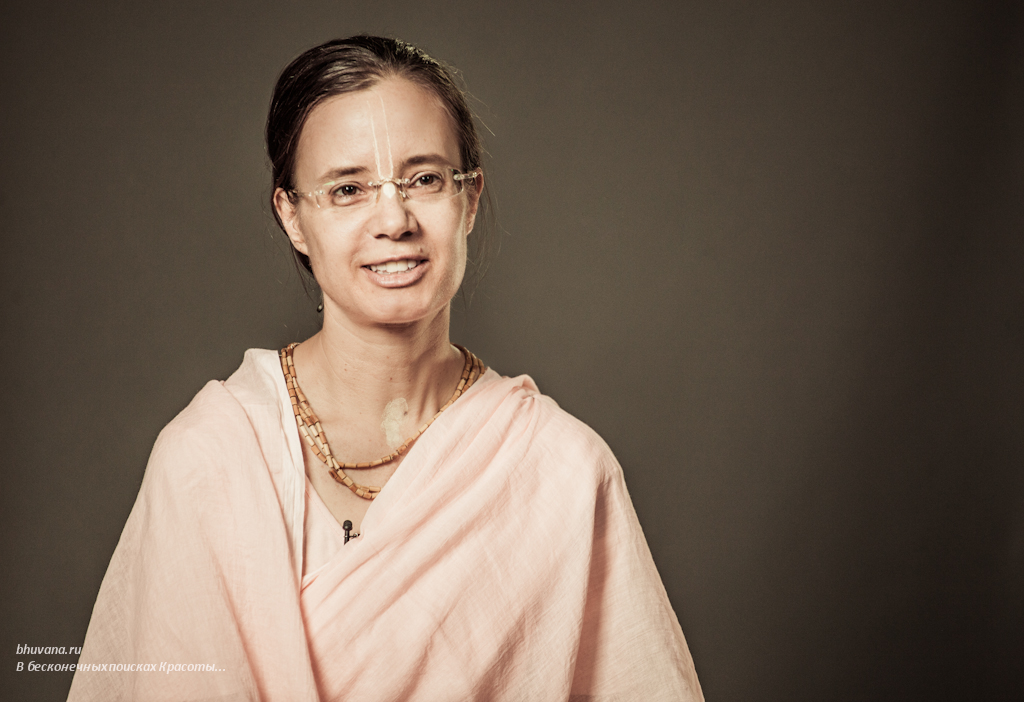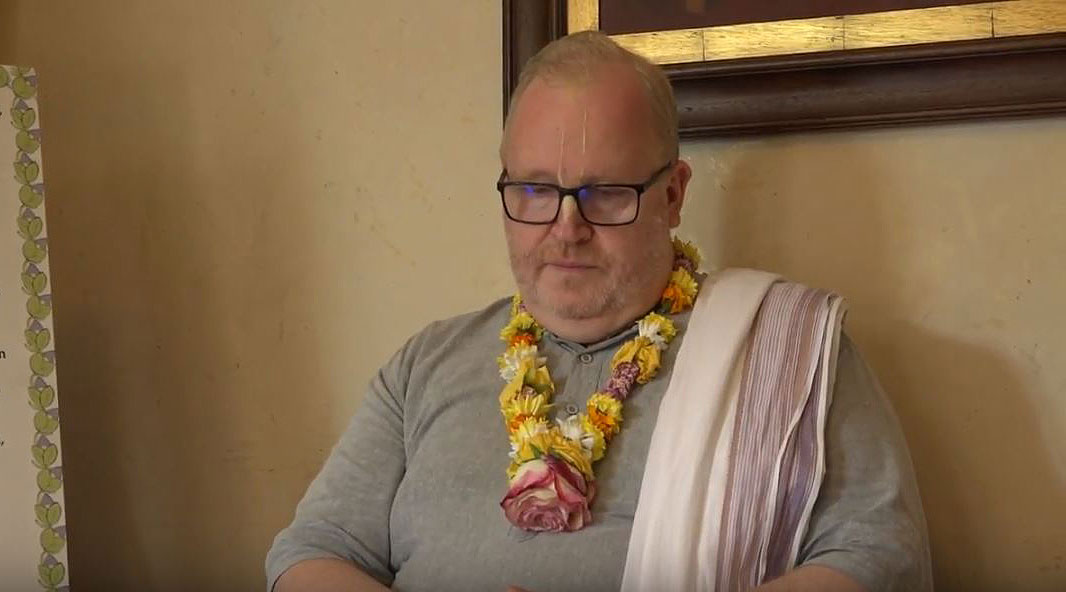All the ideals, high ideals we have ever accumulated or come in association to will all be given up. Not only our physical acquisition but our mental acquisition, all our mental prospects ever acquired—all given up. Dissolution of the whole mind, body, and only soul, naked soul will be taken to that land, with the help of so many saints of that calibre.
You can find the full audio recording and transcript of this talk here
ā-viriñchyād amaṅgalam
One is to look, with very neglected dignity, at even the post of the creator of this world. Lord Brahma, who can create this world, but is in the relativity of this mortal, nasty, world. Who has created, and who is master of this world, but is in the relativity of this nasty world, his position is also condemnable, what to speak of the ordinary persons.
karmaṇāṁ pariṇāmitvād ā-viriñchyād amaṅgalam
[vipaśchin naśvaraṁ paśyed adṛṣṭam api dṛṣṭa-vat]
(SB 11.19.18)
[“An intelligent person should see that any material activity is subject to constant transformation and that even on the planet of Lord Brahmā there is thus simply unhappiness. Indeed, a wise man can understand that just as all that he has seen is temporary, similarly, all things within the universe have a beginning and an end”.]
You and I, what is our position? Meagre. Even the creator of this whole mundane world is also surrounded with the inauspicious, reactionary consequences of life.
Then, next is “Shivo ’ham, Shivo ’ham, Shivo ’ham”. After Brahma there is Shiva: “Shivo ’ham: I do not care for material comfort, but independent of material comfort as a soul I can live.” That temperament. “Shivo ’ham: I don’t care for any material achievement, I am sufficient in myself. Atmarama, I am self-sufficient. I don’t require any exploitation of this world or of any world.” That is the marginal position.
But the domain over the head of that Shiva is so high, and so charming: when he comes in connection with that, “Oh, I want to enter as a slave to that holy and magnanimous land. I want to be a member, the lowest member of that land. Even an ant’s position in that noble domain is something to be envied, in Vaikuntha. And then over Vaikuntha is Goloka, deeper, the most comprehensive and most subtle, all-pervading. Goloka: a solid circle. It is the highest and subtlemost plane ever found. That is the foundation of all different variety of planes we can experience. Goloka: that is beautiful, that is love. Beauty and love are similar things: they are sweet and beyond power and power-seeking.
This has been definitely brought down for us by Mahaprabhu, Nityananda, and Srimad Bhagavatam, the last treatise of Vedavyas, the giver of the greatest magnitude of revealed truth in this world. Revealed truth in different forms, in its greatest magnitude and detail, was given by Vyasadev, from Badarik Ashram. And the key to that, to the highest cabin, was given first to his son Sukadev. And Sukadev tried to impress the then scholars of India with that highest ideal in the whole theological world. Sukadev did that successfully, and next there was another sitting in Naimisaranya, where 60,000 brahman scholars met just before this Kali-yuga, the iron age. In the assembly of Sukadev there was one present who was srutidhar: having once heard, he could remember eternally. That is srutidhar: only once hearing it is recorded final. There was one such peculiar scholar present, Suta, Ugrasrava: Ugrasrava, whose aural reception was extraordinary, revolutionarily extraordinary. Once one impression was caught, it was final. That Ugasrava, sruti, whose hearing is of a very, very higher degree, the highest degree. He was present in that assembly and he caught it and distributed it to the sixty thousand brahmanic scholars gathered in Naimisaranya just before the beginning of this Kali-yuga, the iron age. That is Bhagavatam.
When these four sittings were completed—one Narad to Vyasa, second Vyasa to Suka, third Suka to Pariksit in the scholar’s assembly, and fourth from Ugrasrava-suta to Saunakadi Rsis—then with an introduction of three slokas, Vyasadev sent it to the market: janmādy asya yato ’nvayāt (1.1.1), dharmaḥ projjhita-kaitavo ’tra paramaḥ (1.1.2), and nigama-kalpa-taror galitaṁ phalaṁ (1.1.3). These three poems introduced Bhagavatam: one about sambandha-jnan, what is what; the second what is the means to the end; and the third, what is the proper conception of the end, of the destination. Where we are, who am I, where am I, what am I—in this way, sambandha-jnan. And second abhideya, what is the means to my end. And third, what is the conception of the proper end of life. Different from all other recommendations from different theological scriptures. This is the speciality of this book: mainly, after liberation, how one can live a dignified life. It is meant for them.
Nirmatsarāṇāṁ satām: they must be free from all jealousy, Vyasadev said. It is meant for those particular saints who are completely free from any trace of jealousy. Nirmatsar. Jealousy means who cannot tolerate that any other than he will be in a higher position. That is jealousy. That is the test. At every step you are to feel without prejudice that everything in your paraphernalia is holding a higher position than you. If you are jealous then you can’t advance a single step there. Jealousy is fully eliminated if you are ready to tolerate that everyone you come across is holding a higher position than you. And you should not mind anything from that. No reaction. If you can tolerate that everything, every dust of that plane is superior, holding a superior position to you, that all are Prabhu, and you are the slave; if you can accommodate yourself in such a way then you will have a very higher place where you can enter and live. But nirmatsarāṇāṁ satām, this is not for the ordinary saints. The jealousy must be exhaustively eliminated. “When you feel that everything is superior and that you are the lowest, then you can hope to come to study this and you will be able to understand what I say; then you can have everything there, you can progress, and you can freely live and move there. But that temperament is the minimum demand from you, and that finishes everything. This demand finishes everything.”
I told one sahajiya,
vaikuṇṭhera pṛthivy-ādi sakala chinmaya
(Sri Chaitanya-charitamrta: 1.5.53)
“In Goloka, and also below in Vaikuntha, everything is made of spiritual dust. All atoms are spiritual, and that is of higher quality than you, soul, who wants to enter there.”
So you are to enter into that domain, and then you can hope to get the company of the Narayan-bhakta, and then higher up in Goloka Vrndavan. It is not a matter of joke, a matter of luxury, so easy. So deserve, then have. No deserve, no having. It is only imitation here, plodding in the mud and thinking I am in the divine lake of Radha Kunda. Death means ‘Die to live’. Death means not only this physical, but mental death, and the death of all our ambitious aspirations. Death means, die to live. Living is also wonderful living. Living is also a wonderful, strange thing in comparison with the present living. There is living. Living along with all good, all high, all divine, all superior. How happy living. Wherever I am breathing, everything is of higher quality than my own self. How happy. How elevating. But have we such courage, boldness to live there, to die a wholesale death? To die a wholesale death of all our experienced life, to be severed from all the valuable things we ever gathered experience of?
Is it possible for us? It is not so easy. All the ideals, high ideals we have ever accumulated or come in association to will all be given up. Not only our physical acquisition but our mental acquisition, all our mental prospects ever acquired—all given up. Dissolution of the whole mind, body, and only soul, naked soul will be taken to that land, with the help of so many saints of that calibre. It is stranger than a dream. Reality is stranger than a dream, than fiction. Our standard of prospect should be raised so high.
If we can have some conception of the truth then we will feel that what we aspire after at present is all sinful, nasty. “Why should I be a master of so many?” We hate slavery, but we will be able to understand what a dignified position it is to be a slave to such wonderful goodness, to a wonderful master. It is possible, not impossible to peep into that higher position of truth. We will be eager to cast ourselves at the feet of those holy persons.
Mahaprabhu once told in Puri to Sanatan Goswami,
sanātana, deha-tyāge kṛṣṇa yadi pāiye
koṭi-deha kṣaṇeke tabe chāḍite pāriye
(Sri Chaitanya-charitamrta: 3.4.55)
“Sanatan, if it would have been possible that by giving up this body I can get Krishna, then in a moment I am ready to sacrifice this body crores [ten millions] of times. In a moment I want to invite, to welcome death crores of times, die to live, if by doing so I can get my Lord Krishna.”
What kind of standard: where is Krishna, of Mahaprabhu’s conception? Mahaprabhu says, “In a moment, ei kṣane, in this moment I am ready to die crores of times, if by the result of that I can get Krishna; but no, Krishna is not so cheap.” What benefit is there by physical death? This is to give up a dress, a flesh and bone dress. What charm is there? There is something more. Some positive life is there. It is not that by negative sacrifice of all that we possess we can go. It is not that if we can have a naked body we can go. No. Some positive attraction for that, that is the real thing. Sraddha, sadhu-sanga. Serving tendency: that is the visa. Not a passport. I can collect any number of passports but a visa is necessary. The sanction of that place is necessary. But they are very broadhearted, very generous, very loving, and infinitely resourceful. Infinite resourcefulness is there.
Now England is trying its best to oust the foreigners. For so long they were liberal, but now a party has raised that so many foreigners have come to live in England and they are making the original British people’s life intolerable. So there must be some check over the immigrants.
But there [Vaikuntha, Goloka] is infinite, and no such limitation is there: “All may come, but come with good will. With good will, with standard good will you should come. You are all welcome, it is infinite, but you are to give up all your anti-tendencies of this land, and to keep them outside. You come, you come for the interest of us; for the whole country, you come. For the Lord, you come. You are all welcome, very earnestly and affectionately welcome. He is Lord of all of us, he is not only the Lord of a particular section, but he is the Lord of all, a loving Lord, an infinite Lord. His love is infinite, his ways are infinite, everything is infinite. So there is no possibility that our portion will be lessened if you come and partake of the service. No. Come. We rather want more; if more may be engaged his service, we will be happy, more happy, more happy. But service, mind that; service must be for his satisfaction. That is the criterion. We are all seeking, searching for his satisfaction, not any one of us, and if we find that lacking there, then we will turn into your enemy. With this idea all can come.”
Spoken by Srila B.R. Sridhar Dev-Goswami, 2 January 1983
This post is a continuation of the article Paradise Lost
You can find the full audio recording and transcript of this talk here

